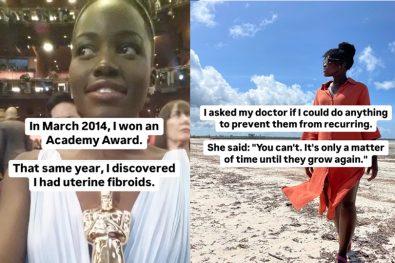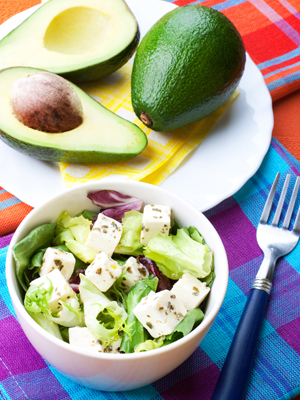By Anne T. Donahue
For the better portion of my life, I (like 99.9% of people reading this) have had issues with body image. I’ve been hard on myself. I’ve been mean to myself. I’ve deprived myself of food to the point that my iron’s plummeted and I’ve morphed into an eternally bruised peach. I’ve equated the way I look to the way I deserve to be treated. I’ve held myself to impossible standards, and kept most of them (and my habits) to myself, lest anybody find out and find out I wasn’t perfect. (Even though I knew I was far from.) I equated feeling sick and weak and tired with doing a good job and having an incredible amount of self-control. And when I recognized what I was doing, the idea of “getting better” seemed terrifying.
Though where my decades of disordered eating have been personal, they’ve also felt very universal. Since finally telling my therapist I needed a hand this past summer, I’ve never confided in anyone who responded to my admission with an inability to relate or understand where I was coming from. We’ve all taken out our insecurities on ourselves in ways that are harmful and sad and dangerous. Which is probably why it annoys me that when I do open up about my own issues, I’m greeted with anything other than, “Oh yeah, I’ve been there” (or been close) or worse: suggestions I go the wellness route, as if I haven’t just admitted how quickly my addictive personality can adapt to suit any and all trends, ever.
But by the time it was fall, I’d started to work through the bulk of where my feelings were coming from. I’d started to eat for sheer joy (and because I wanted to), and began telling the voice in the back of my head that I didn’t have time to hear from it anymore. Sometimes it won, but most of the time the winner was me. And while I knew I had a long way to go before I stopped truly believing that shrinking myself physically would prove how worthy I was of love and success and male attention and, and, and, I at least understood that ideology was the root of my problem. I had no idea how to cure it (that’s what therapy’s for), but I could at least categorize and frame it in a way that made me see it as something that didn’t have to dictate my entire life.
And then, of course, the real shit show began. I got into a car accident, I started doing regular physio, and my biggest problem quickly shifted from the emotional and mental to the desperation to undo the muscle damage and bone bruising I was dealing with. I wore jogging pants and sweatshirts every day because they were soft, and I ate when I wanted to because recovery is exhausting and took up my whole mind so I didn’t have time to micromanage my choices. So I, inevitably, gained weight.
Which was something I was aware of. In December, I’d tried on a pair of jeans from the summer and couldn’t do them up, and a t-shirt that fit perfectly in September was suddenly inappropriately small. By the start of the month, I could feel the rumblings of “if you can’t fit into X size, you don’t deserve to X” begin again, and while I tried to shove them into the same drawer as I kept my pants, they didn’t shut up. So I did the only thing my brain would let me do: I tried on everything I owned, and donated everything that didn’t fit.
It was a Sunday afternoon, and my mom was over, making ribs. (Which were delicious.) This meant I had a friend/ally/someone I knew who’d also dealt with disordered eating and could tell me the truth without sparking a complete meltdown. (Phrasing is important. This is why telling someone who’s lost a shit-ton of weight how good they look “now” is a terrific way to make that same person believe that they will only ever be attractive/cute/lovely/hot/whatever if they are as small or smaller as the size they are in that moment.) So I embarked on my quest. I tried on jeans. I tried on slacks. I tried on sweaters, t-shirts, and dresses, then moved on to button-ups and shorts. I watched as the remnants of my closet began to dwindle, and the bags I placed my too-small clothes fill up and take up part of the living room. I held up a pair of jeans I lived in over the spring, and they looked like doll clothes, and I tried very, very hard not to think everything would be better if I could fit into them again as I placed them in one of the donation bags. But it also scared me that at one point I was so small. Which is why I had to get rid of them: despite being a reminder of how deep I was in disordered eating, I knew I’d also use them as goals to mark how “good” I was being or how much “progress” I could make. And this wasn’t living. Hell, it wasn’t even surviving. It was existing in a non-place. And good luck feeling relatively okay while you’re there. It fucking sucks.
The thing is, I’d love to say this is a story about getting better and feeling myself and knowing my own worth, finally. But this isn’t how any of that works, and every day I will likely have to confront the belief I’ve nurtured since puberty that who I am relies on how little I can sustain myself with because I love control and I need control and control ranks above what’s healthy. But for the first time, I feel ready to confront this. I’m ready to eventually buy new jeans (I’m still living that physio/jogging pant life – and truthfully, it’s comfy here so I’m staying), buy new shorts, and buy new dresses. I’m ready to start going out for supper and not congratulate myself for only eating half of what was served to me. I’m ready to get better, mentally but also physically – which I need mental strength to do, because good lord physio hurts sometimes (and so does life). I’m ready to treat myself and my body . . . better. I’m ready to stop being so mean. I’m ready to like myself. I’m also ready to admit that this will not be some a-ha revelation situation, but a process that takes forever and sticks around to wield its ugly face in moments of feeling like absolute shit. I know, in my core, that who I am has nothing to do with my pant size. But I also know that when my real self is confronted with a situation that makes me feel powerless, I will want to burrow in what’s familiar, regardless of how unhealthy it is. I understand that this is something that will follow me forever, and is something I will likely have to grapple with forever, and is something I will have to tell to shut up forever.
So I began my first, concrete step to fighting back where I could: my wardrobe. I am not about to be ruled by a pair of cropped skinny jeans from the Gap. Instead, they will go to a home of someone who loves and cares about them and can wear them without wanting to cry. And I will do my stretches and exercises for physio, drink my bubbly water, and eat what I’m craving because fuck anything else, truly. Likely while wearing a pair of sweatpants because they fit, and they’re comfortable, and my legs still like to swell up sometimes. Which isn’t the dreamiest way to end an essay, but it’s real life and that’s what I’m trying to live in. No matter how difficult it’s going to be.
Need a little more Anne? Read more from Anne T. Donahue right here!












This story is MY story as well. It sucks that a car accident can turn your life upside down, financially, physically but also mentally. The hurt goes on and on, physio helps but it also hurts. I tell people I am going for a massage, a form of physio, and they automatically think I am treating myself, they do not understand the pain that I am in before my massage and they certainly do not understand the pain after the massage. Nobody understands that when you drive by an accident your mind goes back to that day when your life changed FOREVER. After my accident, I withdrew from all social activities, not just because of the pain and inability to participate but also from embarassment of gaining weight and hating what I looked like. It’s been over 10 years since my accident and I still feel that way…I am not the same person as I used to be. The person that wrote this story is on the right track. Keep fighting to be YOU!